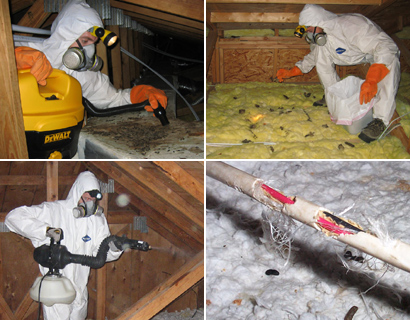- USA Wildlife Removal Education Guide and Resources
Wild Animal Feces in Attic - Danger and Diseases
ATTIC DECONTAMINATION & OTHER SERVICES: In some situations, it may be desirable to clean your attic after you've removed animals from the space. They can leave behind large amounts of droppings, urine, hair, oils, food, nesting material, and so on. These remnants can attract insects like cockroaches, and the scent left behind can encourage new animals to attempt to chew or break their way into your house. You might also experience odor problems from the waste. It's possible or likely that mold will grow on the areas of feces and urine, and urine can damage wood or sheetrock. Some of the mold can potentially cause diseases that people can catch, and some of the feces themselves can cause diseases, such as Salmonella or Leptospirosis, and raccoon feces can contain roundworm eggs, which can infect people.
- We remove or vacuum all droppings, or remove all the soiled insulation.
- We fog the attic with a special enzyme-based cleaner that destroys any organic matter and deodorizes the space.
- We repair damage, such as ductwork, electrical wires, pipes, insulation, and more.
Poop and urine would spread all over your attic. The hard part of cleaning this place is that, not all poops or urine will be accessible by hand. These wastes can possibly contaminate our food or water which will risk our family on getting numerous diseases like the Campylobacter disease, which causes gastric pains. This infection can be found in animal poop. There’s also the Leptospira disease, which can infect us if we get a contact of insulation from the urine of infected animals.
These diseases can be serious if we don’t treat it. Anyway, the diseases I mentioned are just 2 of the 42 diseases we might get from animal poop and urine. I am stating this, so that people will know how important it is for us to clean our attics regularly. Leaving animal waste in your attic leaves your family in a very unhealthy situation, and I know you wouldn’t want this to happen.
In cleaning the animal poop in the attic, some people use an atomizer, an electric powered device that sprays through the whole attic to hit every spot. This method is fast and gets it almost 100% clean. However, before using this kind of device for cleaning procedures, you must first wear a disposable Tyvek suit and a respiratory mask.
This machine cleans by releasing cleaning solution fogs that penetrates and sanitizes the entire attic. This device makes cleaning the attic easy. It can also eliminate animal urine and strong odors. If you can’t afford to buy or rent an atomizer, you can always borrow one from a friend. If you still can’t borrow, you can always clean manually, wherein, involves using gloves, cleaning equipment and special cleaners.
This method is harder and it takes longer to finish, but is cheaper for the fact that you can also save electricity. If you opt for this method, you’ll be having a hard time cleaning the unreachable spots and it’s really important to clean every inch of the room because if there’s an odor left, there’s a big possibility that animal re-infestation may occur. So, make sure that an animal waste removal is done thoroughly and precisely.
It’s also important to replace the insulation with a new and clean insulation to leave no traces of waste and odor. After the removal of animals and their waste, replacing the insulation or walls will be the next and final stage of the cleaning process. Afterwards, this will leave the attic properly insulated and clean again. Another good thing about replacing the insulation is that, it helps control room temperatures. Most homeowners don’t really give much importance about the attic because they rarely spend time in it.
Homeowners give consideration in re-constructing the attic after an infestation to avoid it from happening again. Well, that’s a problem. Why act after an infestation when we can always make our attic animal proof in the first place. If we gave importance to our attic in the time our house was being constructed, then I don’t think animal infestation is going to be an issue. Anyway, according to the U.S. Department of Energy, an attic should have an R-49 insulation blanket. If your house does not have R-49 insulation, you might want to reconsider before everything else is too late.
Go back to the main Animal Removal page for more information about wild animal droppings in the attic, feces, or poop. Are the wild animal feces in the attic toxic or dangerous? What kind of diseases can you catch from wild animal droppings or excrement in the attic of your house.


